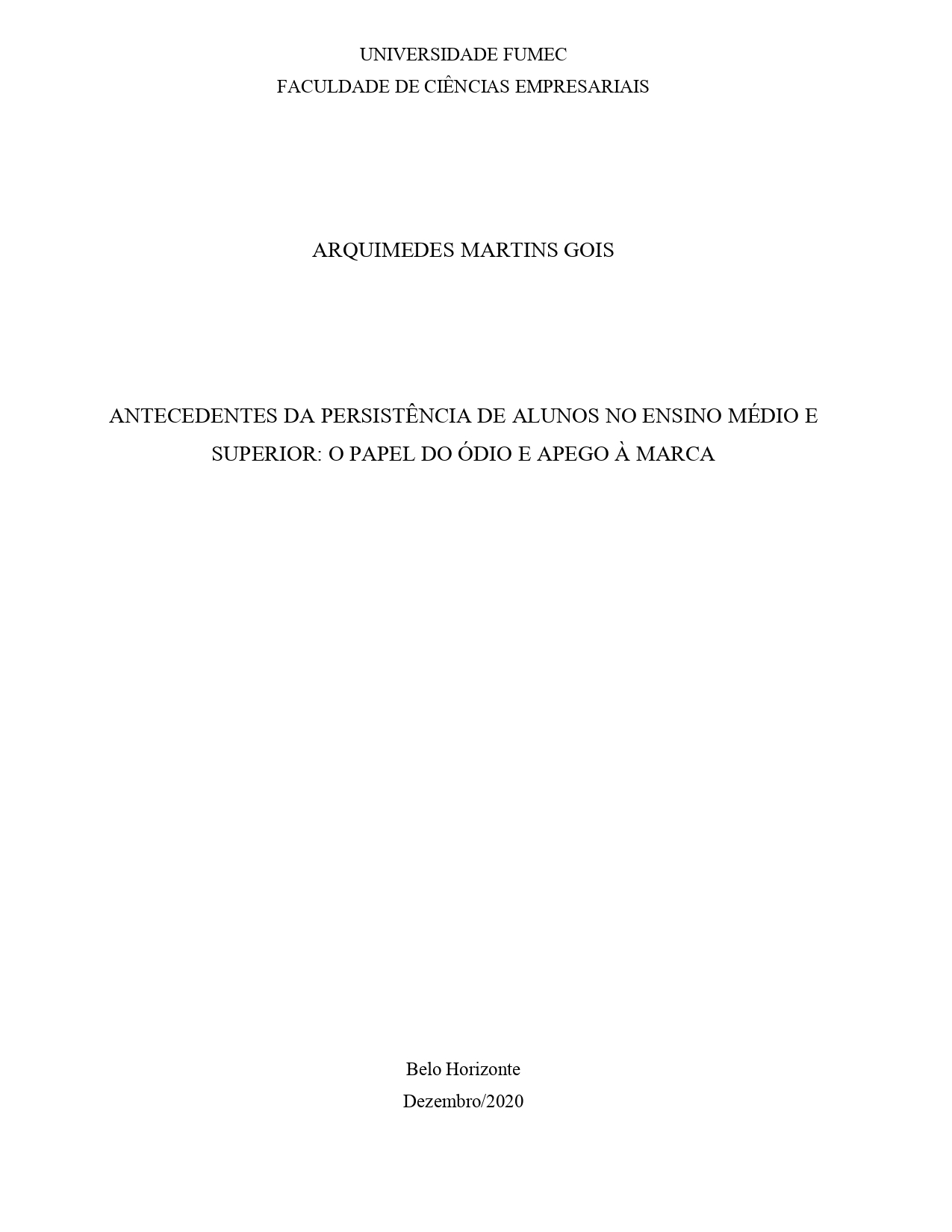Antecedentes da persistência de alunos no ensino médio e superior: o papel do ódio e apego à marca

Visualizar/
Data
2020Autor
Gois, Arquimedes Martins
xmlui.mirage2.itemSummaryView.MetaData
Mostrar registro completoResumo
Esta pesquisa investiga os fatores que levam a persistência de estudantes do ensino
médio e universitários a partir dos conceitos de apego e ódio à marca. Para isso, recorreu-se a
metodologia survey para aplicar um questionário aos alunos do Instituto Federal de Minas
Gerais (IFMG), campus Ouro Preto, a fim de verificar como se dá a relação destes com a marca
da instituição. A metodologia da pesquisa envolveu também uma dimensão teórica dada pelo
estudo do modelo de retenção e evasão de alunos, e por meio do estudo dos conceitos de ódio
e apego à marca e seus determinantes. De acordo com a hipótese deste trabalho, a experiência
passada negativa, a incongruência simbólica e a incompatibilidade ideológica levam ao ódio à
marca, reduzindo a intenção de persistir, enquanto o apego reduz o ódio à marca e aumenta o
apego à marca. Por meio do estudo do instrumental teórico e da interpretação dos dados obtidos
com o questionário, foi possível compreender que a persistência dos alunos do IFMG resulta
de fatores anteriores (habilidades e nível socioeconômico dos alunos) e após a admissão do
aluno (organização do curso e suporte acadêmico-institucional) e também da relação (ódio ou
apego) que desenvolvem com a marca. Assim, conclui-se que a forma como o aluno se relaciona
com a marca pode levar à evasão ou persistência no curso, o que chama a atenção para a
importância de uma política administrativa que zele pelo valor da marca para os alunos. A
pesquisa também reforça a importância de se refletir sobre a evasão e / ou persistência escolar
por meio da Administração, uma vez que a qualidade do vínculo dos alunos com a escola
envolve a maneira como os alunos veem e constroem uma identificação com a escola. This research investigates the factors that lead the persistence of high school and
university students based on the concepts of attachment and brand hate. For this, we used the
survey methodology to apply a questionnaire to students at the Federal Institute of Minas Gerais
(IFMG), campus Ouro Preto, in order to verify how they relate to the institution's brand. The
research methodology also involved a theoretical dimension given by the study of the model of
retention and dropout of students, and by the study of the concepts of brand hate and brand
attachment and its determinants. According to the hypothesis of this work, the negative past
experience, the symbolic incongruity and the ideological incompatibility lead to brand hate,
reducing the intention to persist, while attachment reduces the brand hate and increases brand
attachment. Through the study of the theoretical instrumental and the interpretation of the data
obtained with the questionnaire, it was possible to understand that the persistence of IFMG
students results from previous factors (skills and socioeconomic status of students) and after
the student's admission (course organization and support academic-institutional) and also of the
relationship (hate or attachment) that they develop with the brand. Thus, it is concluded that the
way the student relates to the brand can lead to evasion or persistence in the course, which calls
attention to the importance of an administrative policy that watch over the value of the brand
for students. The research also reinforces the importance of reflecting about school dropout and
/ or persistence through the Administration, since the quality of the students' link with the school
involves the way like the students see and build an identification with the school.
